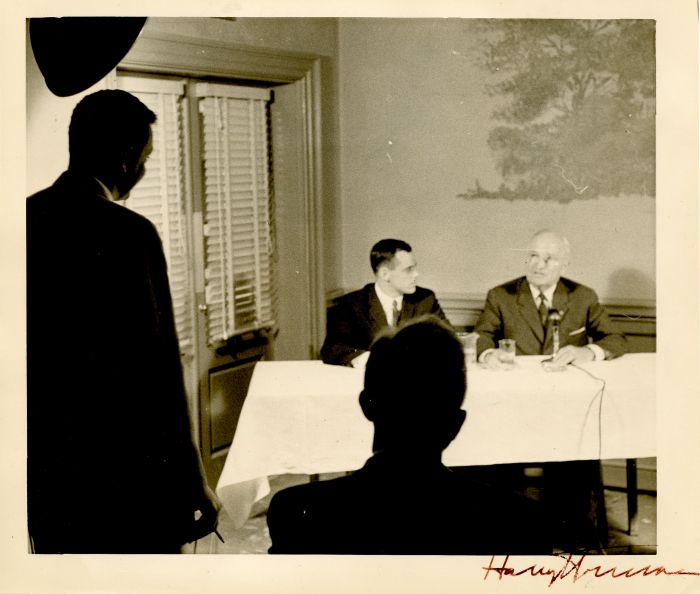Photograph signed by Harry Truman
Inv# AU1502 Photo
Photograph signed by Harry Truman.

Harry S. Truman (May 8, 1884 – December 26, 1972) was the 33rd President of the United States (1945–1953). As President Franklin D. Roosevelt's third vice president and the 34th Vice President of the United States (1945), he succeeded to the presidency on April 12, 1945, when President Roosevelt died less than three months after beginning his unprecedented fourth term.
During World War I, Truman served in combat in France as an artillery officer in his National Guard unit. After the war, he joined the Democratic Party political machine of Tom Pendergast in Kansas City, Missouri. He was elected a county official and in 1934 United States senator. After he had gained national prominence as head of the wartime Truman Committee, Truman replaced vice president Henry A. Wallace as Roosevelt's running mate in 1944.
Truman faced many challenges in domestic affairs. The disorderly postwar reconversion of the economy of the United States was marked by severe shortages, numerous strikes, and the passage of the Taft–Hartley Act over his veto. He confounded all predictions to win election in 1948, helped by his famous Whistle Stop Tour of rural America. After his election, he passed only one of the proposals in his liberal Fair Deal program. He used executive orders to end racial discrimination in the armed forces and created loyalty checks that dismissed thousands of communist supporters from office.
Truman's presidency was also eventful in foreign affairs, with the defeat of Nazi Germany and his decision to use nuclear weapons against Japan, the founding of the United Nations, the Marshall Plan to rebuild Europe, the Truman Doctrine to contain communism, the beginning of the Cold War, the Berlin Airlift, the creation of NATO, the Chinese Civil War, and the Korean War. Corruption in Truman's administration, which was linked to certain members in the cabinet and senior White House staff, was a central issue in the 1952 presidential campaign and helped cause Adlai Stevenson, Truman's successor for the Democratic nomination for the presidency, to lose to Republican Dwight D. Eisenhower in the 1952 presidential election.
Truman, in sharp contrast to the imperious Roosevelt who kept personal control of all major decisions, was a folksy, unassuming president who relied on his cabinet. He popularized such phrases as "The buck stops here" and "If you can't stand the heat, you better get out of the kitchen." His approval ratings in the polls started out very high, then steadily sank until he was one of the most unpopular men to leave the White House. Popular and scholarly assessments of his presidency eventually became more positive after his retirement from politics. Truman's legendary upset victory in 1948 over Thomas E. Dewey is routinely invoked by underdog presidential candidates.










Ebay ID: labarre_galleries